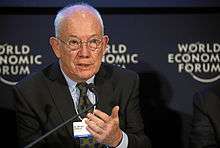W. Brian Arthur
| William Brian Arthur | |
|---|---|
 Arthur at the World Economic Forum Annual Meeting, 2011 | |
| Born |
July 21, 1946 Belfast, Northern Ireland |
| Institutions | |
| Field | Complexity economics |
| Contributions | |
William Brian Arthur (born 21 July 1946) is an economist credited with influencing and describing the modern theory of increasing returns.[1] He has lived and worked in Northern California for many years. He is an authority on economics in relation to complexity theory, technology and financial markets. Presently, he is on the external faculty at the Santa Fe Institute, and a Visiting Researcher at the Intelligent Systems Lab[2] at PARC. He is credited with the invention of the El Farol Bar problem.
Biography
W. Brian Arthur was born in 1946 in Belfast, Northern Ireland. He received his BSc in Electrical Engineering at Queens University Belfast (1966), an M. A. in Operational Research (1967), at Lancaster University, Lancaster, England, and an M. A. in Mathematics at the University of Michigan (1969). Arthur received his PhD in Operations Research (1973) and an M. A. in Economics (1973) from the University of California, Berkeley.
At age 37, Dr. Arthur was the youngest endowed chair holder at Stanford University .[3]
Arthur is the former Morrison Professor of Economics and Population Studies; Professor of Human Biology, Stanford University, 1983–1996. He is the co-founder of the Morrison Institute for Population and Resource Studies[4] at Stanford.
Arthur is one of the distinguished External Research Faculty[5] members at the Santa Fe Institute, Santa Fe, New Mexico, USA. Arthur's long association with the Institute started in 1987 with the introduction and support of Stanford economist and winner of the Nobel Prize in Economics, Kenneth Arrow, and Philip Warren Anderson, winner of the Nobel Prize in Physics. Arthur was named as the first director of the interdisciplinary Economics Program at the Institute beginning in 1988. He was named the Citibank Professor at the Institute in 1994, with the endowment of Citibank and then-Citibank CEO John S. Reed.[6]
He served several terms on the Science Board[7] 1988–2006, and Board of Trustees,[8] 1994–2004, during his association with the Institute.
Arthur was awarded a Guggenheim Fellowship in 1987.[9] Arthur was also awarded the Schumpeter Prize in 1990.[10]
He was awarded an honorary Doctor of Economic Sciences degree from the National University of Ireland (2000).
He was awarded an Honorary Doctor of Science Degree (Honoris Causa) from Lancaster University on 9 December 2009
He is a Fellow of the Econometric Society, World Economic Forum, and PricewaterhouseCoopers.
Work
Arthur is noted for his seminal works "studying the impacts of positive feedback or increasing returns in economies, and how these increasing returns magnify small, random occurrences in the market place."[11] These principles are especially significant in technology-specific industries.(EL1)
Complexity theory
Arthur is one of the early economic researchers in the emerging complexity field. Specifically, his complexity studies focused on the "economics of high technology; how business evolves in an era of high technology; cognition in the economy; and financial markets."[12]
Arthur's comments on the evolution of complexity theory as a different way of seeing and conducting scientific inquiry:
Complexity theory is really a movement of the sciences. Standard sciences tend to see the world as mechanistic. That sort of science puts things under a finer and finer microscope. In biology the investigations go from classifying organisms to functions of organisms, then organs themselves, then cells, and then organelles, right down to protein and enzymes, metabolic pathways, and DNA. This is finer and finer reductionist thinking.
The movement that started complexity looks in the other direction. It’s asking, how do things assemble themselves? How do patterns emerge from these interacting elements? Complexity is looking at interacting elements and asking how they form patterns and how the patterns unfold. It’s important to point out that the patterns may never be finished. They’re open-ended. In standard science this hit some things that most scientists have a negative reaction to. Science doesn’t like perpetual novelty.[6]
See also
Publications
W. Brian Arthur has published several books, papers, articles and more.[13] A selection:
- 1994. Increasing Returns and Path Dependence in the Economy. University of Michigan Press, Ann Arbor.
- 1997. The Economy as an Evolving Complex System II, edited with Steven Durlauf and David Lane, Addison-Wesley, Reading, MA, Series in the Sciences of Complexity.
- 2009. The Nature of Technology: What it is and How it Evolves. The Free Press and Penguin Books.
References
- ↑ Foreword by Nobel Economist Kenneth Arrow to Arthur's book Increasing Returns and Path Dependence in the Economy
- ↑ Intelligent Systems Lab
- ↑ Complexity, M. Mitchell Wardrop
- ↑ Morrison Institute for Population and Resource Studies
- ↑ External Research Faculty
- 1 2 "Coming from Your Inner Self, Conversation with W. Brian Arthur, Xerox PARC, April 16, 1999, by Joseph Jaworski, Gary Jusela, C. Otto Scharmer". [Dialog on Leadership]. Archived from the original on 11 October 2007. Retrieved 27 October 2007.
- ↑ Science Board,
- ↑ Board of Trustees
- ↑ "John Simon Guggenheim Foundation | W. Brian Arthur". www.gf.org. Retrieved September 13, 2016.
- ↑ International Joseph A. Schumpeter Society, Schumpeter Prize in Economics
- ↑ "Legg Mason conference bio for W. Brian Arthur". [Legg Mason]. Retrieved 19 November 2007.
- ↑ "Short Background: Brian Arthur". Santa Fe Institute. Retrieved 27 October 2007.
- ↑ For a further selection of papers, articles, lectures and papers, see Some Selected Papers
External links
- W. Brian Arthur, External Research Faculty, Santa Fe Institute
- Legg Mason Thought Leader Forum 2004 at the Wayback Machine (archived 8 January 2006), Dr. Arthur's remarks plus mind-mapped notes.